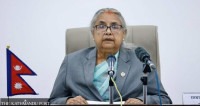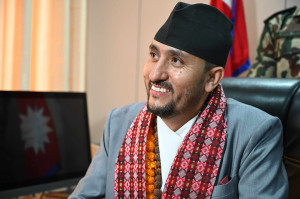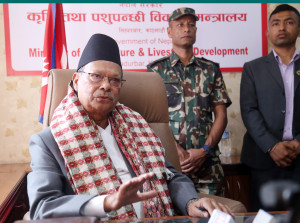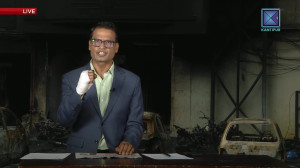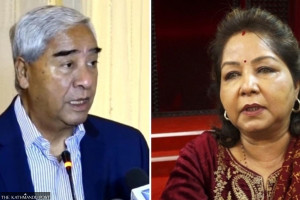Politics
Hindu state debate returns in Congress
Renewed calls to scrap secular status expose ideological rift in the grand old party.
Purushottam Poudel
The issue of restoring Nepal’s Hindu state status has resurfaced in the ongoing central committee meeting of the Nepali Congress.
The renewed debate has revealed a deep ideological struggle within the grand old party over religion, identity, and voter alignment, especially as new political forces gain ground and public support for traditional political parties declines.
At the party’s Mahasamiti meeting held in February 2024, some members had even launched a signature campaign in support of declaring Nepal a Hindu state. Although the campaign did not get official recognition in the party, similar calls have continued to surface in recent years. This recurring discourse has been further amplified by public statements of several senior leaders.
Shekhar Koirala, a leader from the party’s dissident faction, has consistently expressed his support for a Hindu state through various public platforms.
Similarly, during Sunday’s Central Committee meeting, former general secretary of the party, Shashank Koirala, once again raised the issue. Referring to the seven-point agreement between the Congress and the CPN-UML to form the government last year, he stated that constitutional amendment had been identified as a key agenda of the deal.
In this context, he argued, the process of amending the constitution should start by redefining Nepal—currently enshrined as a secular state—as a Hindu state.
“Let us begin the process of amending the constitution by reinstating Nepal as a Hindu state,” a Central Committee member of the Congress quoted Shashank Koirala as saying.
This is not his first such appeal. He had previously called for the same during the party’s Mahasamiti meeting last year.
Prakash Sharan Mahat, the party spokesperson also emphasised the need for the party to address its declining public support. Speaking at the meeting of the Congress Central Committee, Mahat warned that if the party fails to retain its traditional voter base which believes in historical legacy, religion, culture, civilisation, and core ideology, it could face a big setback in upcoming elections.
“Our party is old, and the public is increasingly disillusioned with old parties. New parties are emerging under new names. In such a context, the erosion of our traditional base must be taken seriously,” Mahat said.
He further cautioned that unless the party clearly and firmly presents its core values—particularly its religious and cultural beliefs—it risks serious damage.
“We represent the people who follow Hinduism, Buddhism, Kiratism, and nature-worship traditions. This places the party at the centre of politics. The communists reject religion, but we are believers. That is the foundation of our party, and we must protect it,” Mahat stated.
But not all Congress leaders support the idea of a Hindu state. While Shekhar and Shashank—both active members of the influential Koirala family—have stood in favour of a Hindu state, Sujata Koirala, former deputy prime Minister and foreign minister, remains firmly opposed to the demand for amending the constitution to redefine Nepal’s religious identity.
Sujata is the only daughter of the late prime minister Girija Prasad Koirala, under whose leadership Nepal was declared a secular state in 2007, following the success of the second People’s Movement which ended monarchical rule.
“Constantly changing the country’s official identity undermines stability,” Sujata Koirala told the Post. “I stand with the secular principles enshrined in our constitution.”
She further warned that giving special status to a single religion in a religiously diverse nation like Nepal could lead to unrest. Reversing the secular status, she argued, will not be a responsible political move.
She stated that the country’s current priority should be development, and accordingly, the party must also adopt development as its principal agenda. She further added that the current need is not a debate over religion.
In this connection, the Congress Professional and Intellectuals Department, along with the party-affiliated Democratic Lawyers’ Association (DLA), had submitted a report to party president Sher Bahadur Deuba in March.
According to Dila Sangroula, chief of the party’s department, under whose leadership the party had prepared the report, the report was prepared in line with the party’s priorities on constitutional amendments as pledged during the time of formation of the current government.
A key recommendation in the report is holding a nationwide discussion on secularism. The 2015 Constitution declared Nepal a secular republic, but the study committee report suggests that the party should be open to discussing the proposal to reinstate the Hindu state.
It is not unusual for voices supporting the idea of Nepal as a Hindu state—reflecting what appears to be the desire of the majority of Nepalis—to emerge in various forums of the Nepali Congress, says political analyst Geja Sharma Wagle.
Wagle points out that while the Congress officially stands for religious freedom, it does not necessarily advocate secularism.
“But the party continues to uphold Nepal’s status as a secular state as enshrined in the constitution,” Wagle further said, “Unless the party officially changes its stance, personal views of some leaders cannot be taken as representative of the party’s official position.”




 19.45°C Kathmandu
19.45°C Kathmandu
